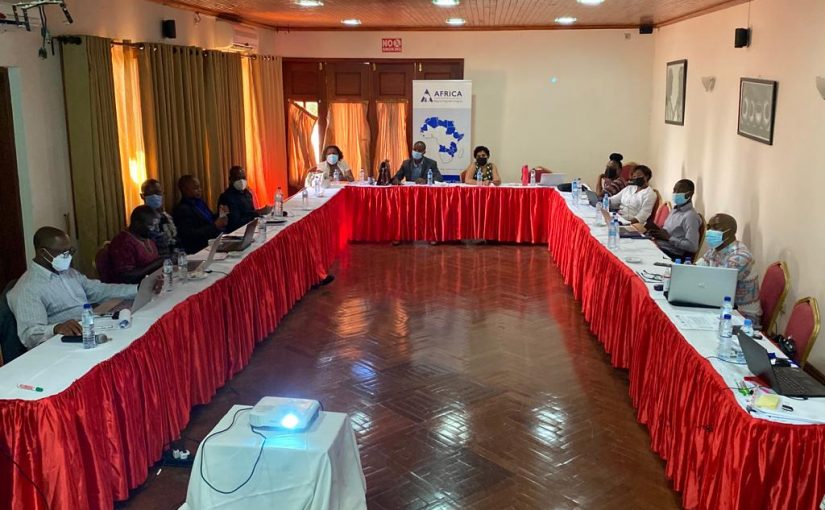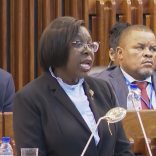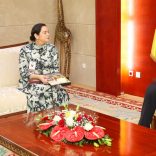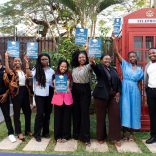Mozambique: Norway and UN project to strengthen women's participation in peacebuilding
IOM enhances the capacity of Government stakeholders on legal identity management with the support of the German Federal Foreign Office (GFFO)

Photo: Twitter / @IOM_Mozambique
The International Organization for Migration in Mozambique aims to capacitate relevant personnel of the National Migration Service’s (SENAMI), the Ministry of Interior, the Ministry of Justice Constitutional and Religious Affairs (MJCR), and the National Criminal Investigation Police (SERNIC) through a series of three trainings, which include a legal identity and identity management training for high level officials, a security documents and fraud detection training, and a technical training on identity management equipment.
The three trainings are taking place from 6 to 10 December 2021 in Maputo and are implemented within the project Strengthening Community Engagement and Policing (CEP) and Integrated Border Management (IBM) in Cabo Delgado, Mozambique, and Mtwara, United Republic of Tanzania, funded through the generous support by the German Federal Foreign Office (GFFO).
The project, which started in July 2021, seeks to improve community-police relationships and strengthen border security, contributing to peace and stability in the border areas of Mozambique (Cabo Delgado) and the United Republic of Tanzania (Mtwara).
The project includes strengthening and capacity building of communities, law enforcement and border officials on the following components: I) Community Engagement and Policing; II) Intelligence Led Policing; III) Investigative Policing and IV) Cross Border Cooperation.
Technical Working Group on Migration Management trained in Mixed and Irregular Migration held in Marracuene/Maputo
Capacity building aimed to:
1⃣Strengthen knowledge
2⃣Better manage mixed migratory flows
3⃣Assist vulnerable migrants through correct identification/referral pic.twitter.com/ENMRV3PaO7— IOM Mozambique (@IOM_Mozambique) December 6, 2021
Mozambique has historically been exposed to irregular flows of persons due to its long and to a certain extent porous borders. Factors such as trade, the pursuit of economic opportunities, family ties, but also climate change, natural disasters, as well as exacerbate the trends. More recently, security-related factors have also come into play, including the proliferation of Transnational Organised Crime (TOC) and Non-State Armed Groups (NSAG).
“Today, we face fundamental challenges in our bid to address the legal identity gap in Africa” , “to lack a legal identity document means that you do not exist at all in the eyes of the state, a scenario that is critically alarming” and “I am therefore delighted that Germany can contribute through this IOM implemented project to more efficient management of cross-border traffic which will also contribute to the socio-economic development of the border regions of Mozambique and Tanzania.” said Ingmar Kreisl, Deputy Head of Cooperation from the German Embassy to the Republic of Mozambique.
To address this situation, and ensure that migration occurs in a safe, orderly, and regular manner that contributes to the socio-economic development of the country as well as peace and stability, IOM plans to conduct capacity building on Legal Identity and Identity Management for key governmental actors operating in the area. The work on Legal Identity is complementary to the support IOM is providing to the Government of Mozambique, notably the MJCR, in the re-issuance of birth certificates for Internally Displaced Persons (IDPs).
Other topics covered by the trainings include the inspection of travel documents and the detection of fraudulent documentations, in line with international standards, to help SENAMI personnel to fulfil their mandate in a professional, effective, and ethical manner as well as to identify SENAMI personnel that could be selected for the conduction of future Training of Trainers (ToT).
“IOM is glad to witness the exchange of knowledge and expertise as well as the use of international instruments contributing to an improved knowledge of legal Identity, identity management, and ensuring that migrants are issued adequate documentation and civil registry documents, such as birth, marriage and death certificates, at all stages of migration, as a means to empower migrants to effectively exercise their human rights,” highlighted Sascha NLABU, IOM Mozambique’s Head of Programmes & Operations.
Since 2015, IOM is supporting the Government of Mozambique in the implementation of integrated border management and immigration processes, with the objective to strengthen border security and to achieve a better managed flow of persons and goods which capitalize on the developmental potential of migration.













Leave a Reply
Be the First to Comment!
You must be logged in to post a comment.
You must be logged in to post a comment.